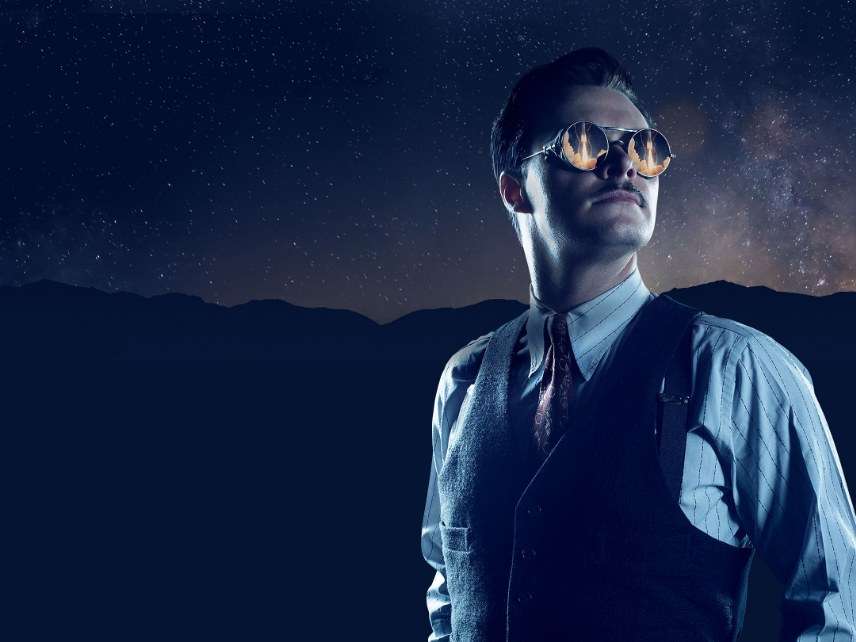CBS Dabbles in America's Unusual Occult History in Strange Angel
Book-based bioseries delves into the life of a rocket scientist with a dark side.
Strange Angel. Available now on CBS All Access.

In an epoch when we've already had television shows about heroic motorcycle gangs and cuddly-puppy serial-killers-next-door, I suppose we shouldn't be surprised when a devil-worshiping aerospace engineer takes center stage. Yet the effects of the digital age on television diversity continue to amaze me.
It was not so long ago that any American who turned on his television at 8 p.m. on a Friday had a choice of Family Matters, Uncle Buck, America's Most Wanted, Quantum Leap, or putting a gun in his mouth. And now the digital arm of what used to be known as The Tiffany Network has a series with a hero, or at least protagonist, who regularly masturbates on magic tablets in an attempt to summon the Whore of Babylon.
To be fair, neither the Whore of Babylon nor any of her precursor acts has appeared in the first three episodes of Strange Angel. But it should be just a matter of time. The series is based on a biography of Jack Parsons, a real-life pioneer of American rocketry and one of the founders of NASA'S Jet Propulsion Lab. More interestingly, he was also a follower of Aleister Crowley, the wandering, omnisexual occultist, practitioner of black magic and, at the very least, Luciferian fellow traveler. (Crowley always denied being a Satanist, but rather undercut his claim by referring to himself as "the Beast 666" and mailing out "Antichristmas cards.")
Parsons was not just a dabbler in Crowley's Thelima religion but a congregant sufficiently faithful and enthusiastic to have written a volume called The Book of AntiChrist. He stuck with Crowley though several wives, jobs, and security clearances before an early and violent demise. (Spoiler alert: Seventy years on, he still hasn't come back.)
The retelling of this story requires a worthy and weird vehicle, and Strange Angel appears up to the task. Photographed with a full palate of darkness and gloom, cautiously edging from its prosaic suburban starting point out to the emotional thin ice of sexual obsession and emotional uncertainty, it proceeds in the deliberative tones of the best horror stories.
The show starts around 1938, on the eve of World War II, with what seems like a typical young-newlyweds-with dreams scenario. Jack Reynor (What Richard Did) plays Parsons, a Stanford dropout who works in a Pasadena chemical factory by day and experiments with rockets by night, hoping some come up with something promising enough to get funding from Cal Tech.
His pretty blonde wife Susan (Bella Heathcoat, The Man in the High Castle) stands behind him, and rocketry partner Richard Onstead (Peter Mark Kendall, Chicago Med) loves his genius for devising fuels, if not the occasion explosions that go with it.
But with a closer look, spidery cracks appear in this picture. Sex between Jack and Susan is rushed and laborious. Their mortgage payments are two months behind because so much of their money goes into rocket fuel. (That's in addition to all the fuel Jack steals.) And Jack himself is worried his frequent lapses into daydreams drawn from the pulp sci-fi magazines he reads.
As these strains emerge, a new character appears: Ernest Donovan (Rupert Friend, Carrie's jack-of-all-lethal-trades CIA pal on Homeland), who moves into the empty house next door to Jack and Susan. Full of unasked favors and unsettling habits like walking into their home (he airily brushes away objections with the slogan, "Do what thou wilt shall be the whole of the law"), Ernest sparks an unwelcome sexual tension with Susan, and a grudging fascination in Jack, who secretly follows him to a mysterious meeting one night.
Peeking through a back window, Jack sees what looks like a barely-unconsummated virgin sacrifice, and not the kind that's performed in back seats at the drive-in movies. Meanwhile, Jack's dreams begin drifting back into forgotten parts of his past, including a boyhood attempt to speak to the dead through a pentagram chalked on his bedroom floor.
Crowley—who seemed endlessly at the center of depraved scandals throughout the 1920s involving everything from the death of follower said to have drunk the blood of a sacrificed cat to poetry extolling pederasty—exercised a mysterious and magnetic allure on the public of the era, one that repulsed many in authority. Mussolini kicked him out of Italy; the British press dubbed him the wickedest man in the world. The Beatles put him on the cover of Sgt. Pepper's Lonely Hearts Club Band. Even today, internet loons brood about whether he might secretly have been the father of Barbara Bush. (Which would make George W. Bush, you know…)
That malign enthrallment oozes through Strange Angel. It's much more than the simple thrill of the forbidden, though that's certainly part of it. The sexual restiveness, the quest for an exotic plane of spiritualism, the touch of buttons in dark places—all of them are deeply felt in Strange Angel. Go ahead. Reach out for your inner creep. And wonder if he'll reach back.


Show Comments (40)